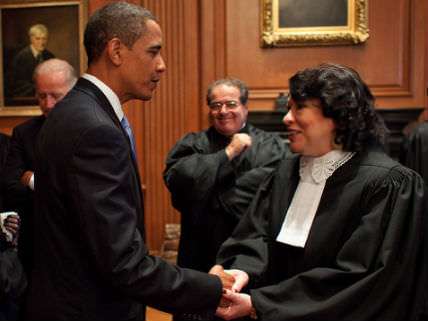Sonia Sotomayor Stands Up for the Fourth Amendment
Justice Sotomayor emerges as an outspoken Fourth Amendment defender.

Justice Sonia Sotomayor is fast becoming the Supreme Court's biggest defender of the Fourth Amendment. After examining her record over the past few SCOTUS terms, including the term that just concluded this week, it's clear that Sotomayor has emerged as a consistent and outspoken voice in favor of broad Fourth Amendment rights. Here's a brief look at some of Sotomayor's most notable actions in recent Fourth Amendment cases.
Missouri v. McNeely
At issue in this 2013 dispute is whether the Fourth Amendment stands in the way of the police obtaining a warrantless and nonconsensual blood test from a suspected drunk driver. Writing for the majority, Sotomayor held that the amendment is indeed such a bulwark. "In those drunk-driving investigations where police officers can reasonably obtain a warrant before a blood sample can be drawn without significantly undermining the efficacy of the search," Sotomayor wrote, "the Fourth Amendment mandates that they do so."
Navarette v. California
In this 2014 case a majority of the Supreme Court said that no Fourth Amendment violation took place when the police conducted a traffic stop and resulting drug bust based solely on information obtained from an anonymous telephone tip. "The Court's opinion serves up a freedom-destroying cocktail," Justice Antonin Scalia seethed in dissent. "All the malevolent 911 caller need do is assert a traffic violation, and the targeted car will be stopped, forcibly if necessary, by the police." That troubling scenario, Scalia wrote, "is not my concept, and I am sure it would not be the Framers', of a people secure from unreasonable searches and seizures." Sotomayor signed on to Scalia's dissent.
Rodriguez v. United States
At issue in this case was whether a police officer "unnecessarily prolonged" an otherwise legal traffic stop when he called for backup in order to walk a drug-sniffing dog around the stopped vehicle. During the January 2015 oral arguments, Justice Department lawyer Ginger Adams insisted that the police are entitled to broad leeway when it comes to determining the amount of time that's "reasonably required" in that sort of situation. Justice Sotomayor took a decidedly different view. "We can't keep bending the Fourth Amendment to the resources of law enforcement," an exasperated Sotomayor lectured Adams. "What you're proposing," she told the government lawyer, is an approach that's "purely to help the police get more criminals, yes. But then the Fourth Amendment becomes a useless piece of paper." Three months later Sotomayor joined the majority in voiding the officer's unconstitutional actions.
Mullenix v. Luna
This case centered on a whether or not a police officer was entitled to qualified immunity after using deadly force to end a high-speed car chase. In a 2015 per curiam opinion, the Supreme Court held that the officer was entitled to qualified immunity. In a lone dissent, Sotomayor faulted her colleagues for "sanctioning a 'shoot first, think later' approach to policing [that] renders the protections of the Fourth Amendment hollow."
Utah v. Strieff
In this 2016 ruling the Supreme Court held that the Constitution does not prohibit law enforcement officials from using evidence that had been obtained as a result of an illegal police stop because it turned out that the man who was illegally stopped happened to be the subject of an outstanding traffic warrant. "This case allows the police to stop you on the street, demand your identification, and check it for outstanding traffic warrants--even if you are doing nothing wrong," Sotomayor fumed in dissent. "If the officer discovers a warrant for a fine you forgot to pay, courts will now excuse his illegal stop and will admit into evidence anything he happens to find by searching you after arresting you on the warrant." In her view, "the Fourth Amendment should prohibit, not permit, such misconduct" by the police.
Birchfield v. North Dakota
The final case in our list was decided just last week. At issue here was whether warrantless chemical tests for suspected drunk drivers violate the Fourth Amendment. In a divided opinion, the Court held that warrantless blood tests do violate the Constitution but warrantless breath tests do not. Writing separately, Justice Sotomayor insisted that both types of warrantless DUI tests should have been struck down as unconstitutional. "Because no governmental interest categorically makes it impractical for an officer to obtain a warrant before measuring a driver's alcohol level," Sotomayor wrote, "the Fourth Amendment prohibits such searches without a warrant, unless exigent circumstances exist in a particular case."
